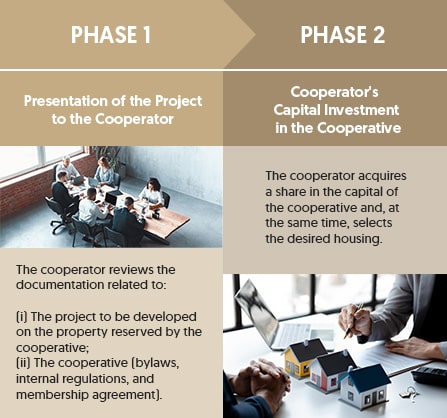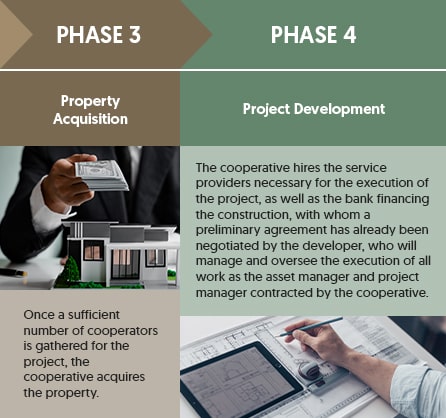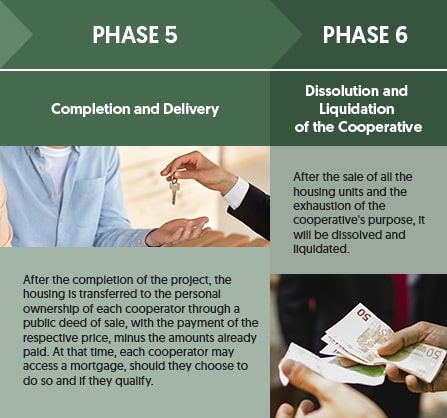Housing Cooperative
What is a Housing Cooperative with Individual Ownership?
Housing cooperatives are autonomous legal entities, whose main purpose is the "development, construction, or acquisition of homes for their members' habitation."

• The Cooperative Code (Law No. 119/2015, of August 31); and
• The Legal Framework for Housing and Construction Cooperatives (Decree-Law No. 502/99, of November 19)
![Housing Cooperative - Risks]() Are There Risks?
Are There Risks?
As with all real estate development projects, there are risks that must be considered, including:
• Potential delays in obtaining permits – the developer focuses on projects with mitigated licensing risk;
• Potential delays in construction execution.
• Changes in circumstances leading to increased costs;
• Imposition of additional requirements on the project by licensing/supervisory authorities.
What is the Role of the Developer?
The developer is dedicated to the development of residential projects using a cooperative model: identifying opportunities, bringing together interested parties, and providing them with a service that includes the setup and oversight of the cooperative. This includes managing the construction project from the design phase (projects and permits) to the completion of the work and the turnkey delivery of the homes to the cooperators.

![Housing Cooperative - Advantages]() What are the Advantages of Acquiring a Home through a Cooperative?
What are the Advantages of Acquiring a Home through a Cooperative?
| 1 | Elimination of the developers' economic margin: in a Cooperative, the developers are the Cooperators themselves and each Cooperator has the guarantee that they will have their housing at cost price. |
| 2 | Phased capital entry: Cooperators make payments according to a pre-defined schedule (usually at five different times – at the time of joining the Cooperative, at the acquisition of the Property, at the beginning of construction, in the middle of construction and at the time of acquisition end of the respective House(s)). |
| 3 | Limitation of Cooperators' liability to the value of the respective investment. |
| 4 | Access to co.op.homes management and monitoring services, which has an experienced and specialized team. |
| 5 | Possibility of transferring the Cooperative's equity titles during the development of the Project, upon compliance with certain admission conditions required of new Cooperators. |
![Housing Cooperative - Tax Framework]() What is the Tax Framework?
What is the Tax Framework?
The Cooperative benefits from:

![Housing Cooperative - Process]() How does it work?
How does it work?



What are the Governing Bodies of the Cooperative?
General Assembly
Composed of the cooperators, each having one vote (regardless of the size and number of homes). Assembly Board: President and Vice President.
Board of Directors
Composed of 1 president and 2 members, appointed by the developer.
Supervisory Board
Composed of 1 president and 2 members.
Official Auditor
Official auditor or auditing firm.
Important Note: The information in this glossary is for informational purposes only. For proper advice on legal or tax matters, consultation with a duly authorized lawyer, notary, solicitor, or accountant is essential.
Your next step in the real estate market
Whether you want to sell your property for the maximum value or find the ideal home, count on my experience as a Top Producer consultant at KW Portugal. Talk to me without obligation. Start today with a simple contact.
Contact Me Today
Related articles




 Are There Risks?
Are There Risks? What are the Advantages of Acquiring a Home through a Cooperative?
What are the Advantages of Acquiring a Home through a Cooperative? What is the Tax Framework?
What is the Tax Framework? How does it work?
How does it work?
